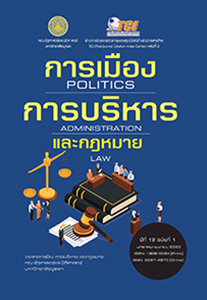การออกแบบระบบมาตรฐานด้านการจัดการและสัมฤทธิ์ผลของงานภาครัฐ ในเรื่องระบบบริการภาคเอกชนและประชาชน (P.S.O. 1107) ของโรงพยาบาลศิริราช ปิยมหาราชการุณย์
คำสำคัญ:
การดำเนินการภาคเอกชน, เกณฑ์การจัดการ, การบริการสุขภาพ, ความเท่าเทียม, ความรับผิดชอบบทคัดย่อ
การวิจัยนี้มีวัตถุประสงค์เพื่อศึกษาระบบการจัดการในรูปแบบภาคเอกชนของโรงพยาบาลศิริราชปิยมหาราชการุณย์โดยนำ 5 ส่วนประกอบหลักจากระบบการบริการภาคเอกชนและประชาชนจากมาตราฐานด้านการจัดการและสัมฤทธิ์ผลของงานภาครัฐมาใช้เป็นกรอบแนวคิด ว่าด้วยเรื่อง ประสิทธิภาพคุณภาพ ความเท่าเทียม การตอบสนอง และความพร้อมในการให้บริการ เพื่อใช้เป็นแนวทางในการสร้างระบบการจัดการมาตราฐานโรงพยาบาลภาคร้ฐในรูปแบบเอกชน การวิจัยเรื่องนี้ดำเนินการวิจัยตามระเบียบวิธีวิจัยเชิงคุณภาพ โดยใช้วิธีการศึกษาเอกสารจากข้อปฎิบัติในระบบการบริการภาคเอกชนและประชาชน และงานวรรณกรรมอื่นๆ ที่เกี่ยวข้องกับ กรอบความคิดการดำเนินการรูปแบบเอกชนและการบริการสาธารณสุข เพื่อใช้อธิบายว่าการนำรูปแบบการดำเนินการแบบเอกชนมาใช้ในภาคสาธารณสุขสามารถสร้างค่านิยมทางสังคมและส่งผลกระทบต่อสังคมอย่างไรได้บ้าง อีกหนึ่งวิธีที่ใช้คือ วิธีการสัมภาษณ์แบบกึ่งโครงสร้าง และการสัมภาษณ์เชิงลึก เพื่อที่จะสามารถได้รับข้อมูลที่ถูกต้องและตรงตามสาระสำคัญสำหรับการศึกษาในครั้งนี้ ผลการวิจัยพบว่า การนำรูปแบบการดำเนินการภาคเอกชนมาใช้ในโรงพยาบาลศิริราชปิยิมหาราชการุณย์ ช่วยให้โรงพยาบาลสามารถพัฒนาได้ในระดับหนึ่ง เช่น เรื่องประสิทธิภาพในการใช้ทรัพยากรบุคคลให้เกิดประโยชน์สูงสุด ประสิทธิภาพในพัฒนาทางการเงิน ประสิทธิภาพในการให้บริการการวดเร็วยิ่งขึ้น หรือเรื่องคุณภาพของการให้บริการสุขภาพที่ได้รับการรับรองจากมาตราฐานสากล JCI ซึ่งทำให้โรงพยาบาลศิริราชปิยิมหาราชการุณย์สามารถยกระดับการบริการด้านสุขภาพให้ดีกว่าโรงพยาบาลศิริราช ภาครัฐ ที่ยึดปฏิบัติตามเกณฑ์มาตราฐาน HA อย่างไรก็ตาม ทั้งสองโรงพยาบาลยึดมั่นในคุณภาพการรักษาเดียวกัน ถึงแม้ว่าโครงการบริการการแพทย์ในรูปแบบเอกชนจะตอบสนองความต้องการของบุคลากรทางการแพทย์และผู้ป่วยที่สามารถจ่ายได้ ข้อเสียที่ปรากฎขึ้นจากการก่อตั้งโรงพยาบาลศิริราชปิยมหาราชการุณย์ คือ ปัญหาเรื่องความไม่เท่าเทียม เช่น อุปสรรคทางการเงินที่เกิดจากให้บริการสุขภาพรูปแบบเอกชน อุปสรรคในการเข้าถึงการให้บริการสำหรับผู้ป่วยที่มีข้อกำจัดเรื่องการใช้จ่ายซึ่งเกิดจากการติดตั้งสิ่งอำนวยความสะดวกแบบเอกชน และอุปสรรคทางวัฒนธรรมทางองค์กรที่ส่งผลให้บุคลากรทางการแพทย์ปฎิบัติตนไม่เป็นธรรมหลังจากนำรูปแบบการดำเนินการภาคเอกชนมาปรับใช้ในโรงพยาบาล






